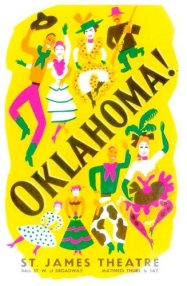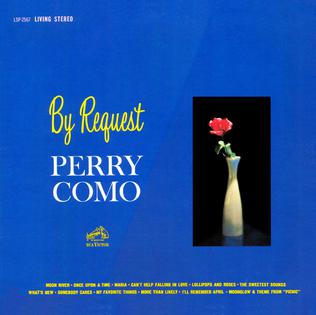
Oscar Greeley Clendenning Hammerstein II was an American lyricist, librettist, theatrical producer, and director in musical theater for nearly 40 years. He won eight Tony Awards and two Academy Awards for Best Original Song. Many of his songs are standard repertoire for vocalists and jazz musicians. He co-wrote 850 songs.

The Sound of Music is a musical with music by Richard Rodgers, lyrics by Oscar Hammerstein II, and a book by Howard Lindsay and Russel Crouse. It is based on the 1949 memoir of Maria von Trapp, The Story of the Trapp Family Singers. Set in Austria on the eve of the Anschluss in 1938, the musical tells the story of Maria, who takes a job as governess to a large family while she decides whether to become a nun. She falls in love with the children, and eventually their widowed father, Captain von Trapp. He is ordered to accept a commission in the German navy, but he opposes the Nazis. He and Maria decide on a plan to flee Austria with the children. Many songs from the musical have become standards, including "Do-Re-Mi", "My Favorite Things", "Edelweiss", "Climb Ev'ry Mountain", and the title song "The Sound of Music".

Richard Charles Rodgers was an American composer who worked primarily in musical theater. With 43 Broadway musicals and over 900 songs to his credit, Rodgers was one of the most well-known American composers of the 20th century, and his compositions had a significant influence on popular music.

Lorenz Milton Hart was an American lyricist and half of the Broadway songwriting team Rodgers and Hart. Some of his more famous lyrics include "Blue Moon"; "The Lady Is a Tramp"; "Manhattan"; "Bewitched, Bothered and Bewildered"; and "My Funny Valentine".
Mary Rodgers was an American composer, screenwriter, and author. She wrote the novel Freaky Friday, which served as the basis of a 1976 film starring Jodie Foster, for which she wrote the screenplay, as well as three other versions. Her best-known musicals were Once Upon a Mattress and The Mad Show, and she contributed songs to Marlo Thomas' successful children's album Free to Be... You and Me.

Oklahoma! is the first musical written by the duo of Rodgers and Hammerstein. The musical is based on Lynn Riggs' 1931 play, Green Grow the Lilacs. Set in farm country outside the town of Claremore, Indian Territory, in 1906, it tells the story of farm girl Laurey Williams and her courtship by two rival suitors, cowboy Curly McLain and the sinister and frightening farmhand Jud Fry. A secondary romance concerns cowboy Will Parker and his flirtatious fiancée, Ado Annie.

Moulin Rouge! is a 2001 jukebox musical romantic drama film directed, produced, and co-written by Baz Luhrmann. It follows a young English poet, Christian, who falls in love with the star of the Moulin Rouge, cabaret actress and courtesan Satine. The film uses the musical setting of the Montmartre Quarter of Paris and is the final part of Luhrmann's "Red Curtain Trilogy", following Strictly Ballroom (1992) and Romeo + Juliet (1996). A co-production of Australia and the United States, it features an ensemble cast starring Nicole Kidman and Ewan McGregor, with John Leguizamo, Jim Broadbent, Richard Roxburgh, Jacek Koman and Caroline O'Connor featured in supporting roles.

Rodgers and Hammerstein was a theater-writing team of composer Richard Rodgers (1902–1979) and lyricist-dramatist Oscar Hammerstein II (1895–1960), who together created a series of innovative and influential American musicals. Their musical theater writing partnership has been called the greatest of the 20th century.

Robert Russell Bennett was an American composer and arranger, best known for his orchestration of many well-known Broadway and Hollywood musicals by other composers such as Irving Berlin, George Gershwin, Jerome Kern, Cole Porter, and Richard Rodgers.

"Edelweiss" is a show tune from the 1959 Rodgers and Hammerstein musical The Sound of Music. It is named after the edelweiss, a white flower found high in the Alps. The song was created for the 1959 Broadway production of The Sound of Music, as a song for the character Captain Georg von Trapp. In the musical, Captain von Trapp and his family sing this song during the concert near the end of Act II. It is a statement of Austrian patriotism in the face of the pressure put upon him to join the navy of Nazi Germany following the Anschluss. It is also Captain von Trapp's subliminal goodbye to his beloved homeland, using the flower as a symbol of his loyalty to Austria. In the 1965 film adaptation, the song is also sung by the Captain earlier in the film when he rediscovers music with his children.
"Some Enchanted Evening" is a show tune from the 1949 Rodgers and Hammerstein musical South Pacific. It has been described as "the single biggest popular hit to come out of any Rodgers and Hammerstein show." Andrew Lloyd Webber describes it as the "greatest song ever written for a musical".

The Trapp Family was a singing group formed from the family of former Austrian naval commander Georg von Trapp. The family achieved fame in their original singing career in their native Austria during the interwar period. They also performed in the United States before emigrating there permanently to escape the deteriorating situation in Austria leading up to World War II. In the United States, they became well known as the "Trapp Family Singers" until they ceased to perform as a unit in 1957. The family's story later served as the basis for a memoir, two German films, and the Rodgers and Hammerstein Broadway musical The Sound of Music. The last surviving of the original seven, Maria Franziska, died in 2014 at the age of 99. The youngest and last surviving member of the Trapp Family Singers is Johannes von Trapp.
"Oh, What a Beautiful Mornin'" is the opening song from the musical Oklahoma!, which premiered on Broadway in 1943. It was written by composer Richard Rodgers and lyricist/librettist Oscar Hammerstein II. The leading male character in Oklahoma!, Curly McLain, sings the song at the beginning of the first scene of the musical. The refrain runs: "Oh, what a beautiful mornin'! / Oh, what a beautiful day! / I've got a beautiful feelin' / Ev'rythin's goin' my way." Curly's "brimming optimism is perfectly captured by Rodgers' ebullient music and Hammerstein's buoyant pastoral lyrics."
"Something Wonderful" is a show tune from the 1951 Rodgers and Hammerstein musical The King and I.
"Sixteen Going on Seventeen" is a show tune from the 1959 Rodgers and Hammerstein musical The Sound of Music.

By Request is Perry Como's Ninth RCA Victor 12" long-play album.
"Climb Ev'ry Mountain" is a show tune from the 1959 Rodgers and Hammerstein musical The Sound of Music. It is sung at the close of the first act by the Mother Abbess. It is themed as an inspirational piece, to encourage people to take every step toward attaining their dreams.
"The Sweetest Sounds" is a popular song, with words and music written by Richard Rodgers for the 1962 musical No Strings. The song opens and closes the show for characters Barbara Woodruff and David Jordan, performed by Diahann Carroll and Richard Kiley in the original Broadway theatre production and subsequent cast recording.

Muriel Burrell Smith was an American singer. In the 1940s and 1950s, she was a star of musical theater and opera, and was also the off-film ghost singer in several hit movies. She is perhaps best known in the UK for her 1953 #3 hit single, "Hold Me, Thrill Me, Kiss Me", which was first covered in 1965 by Mel Carter and later in 1994 by Gloria Estefan.

"The Club Is Alive" is a song by British boyband JLS. It was released in the United Kingdom on 2 July 2010 as the lead single from their second studio album, Outta This World. It was also included in the American EP version of their debut album.












